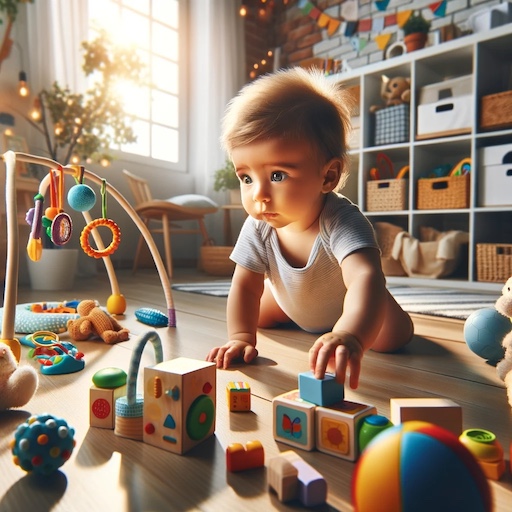Important Milestones For Your Baby By Nine Months
Introduction
By the time babies reach 9 months old, they embark on a fascinating journey of discovery and interaction, signaling significant leaps in their social, emotional, and cognitive development. The skills and behaviors they exhibit during this period offer vital insights into their growth, shedding light on how they play, learn, speak, act, and move. Understanding these developmental milestones is crucial for caregivers, as they not only celebrate achievements but also guide early detection of potential developmental concerns.
The Centers for Disease Control and Prevention (CDC) emphasizes the importance of tracking these milestones, offering resources like the free Milestone Tracker mobile app to support parents and caregivers. Recognizing milestones such as showing a range of emotions, reacting to social cues, and exploring the environment with curiosity, lays the foundation for nurturing a child's development effectively. At 9 months, every interaction with your baby is an opportunity to support their growth into curious, engaged, and resilient individuals.
This guide outlines the key milestones your baby is likely to reach at 9 months old, alongside tips and activities to further their development. Remember, every child is unique, and reaching milestones at their own pace is what makes their developmental journey personal and special.

Key Milestones for 9-Month-Old Babies
By nine months, babies demonstrate remarkable progress in their social, emotional, cognitive, and physical development. Here's a closer look at the significant milestones you might notice in your 9-month-old baby:
Social/Emotional Milestones
- Is shy, clingy, or fearful around strangers, showing attachment and preference for familiar people.
- Displays a range of facial expressions, such as happiness, sadness, anger, and surprise, reflecting emotional diversity.
- Looks when you call their name, indicating recognition and responsiveness.
- Reacts when you leave, such as looking, reaching for you, or crying, demonstrating attachment and separation anxiety.
- Smiles or laughs during peek-a-boo games, showing an understanding of object permanence and enjoyment in social play.
Language/Communication Milestones
- Makes a variety of sounds like “mamamama” and “bababababa”, showing vocal experimentation.
- Lifts arms up to be picked up, using gestures to communicate needs and desires.
Cognitive Milestones
- Looks for objects when dropped out of sight, such as a spoon or toy, understanding that things exist even when not visible.
- Bangs two objects together, exploring cause and effect relationships.
Movement/Physical Development Milestones
- Gets to a sitting position without assistance, showing increased muscle strength and coordination.
- Passes things from one hand to the other, demonstrating improved motor skills.
- Uses fingers to "rake" food towards themselves, refining fine motor skills.
- Sits without support, indicating strong core muscles and balance.
Exploring Key Milestones Further: Insights into Your 9-Month-Old’s Development
Social/Emotional Development Explained
By nine months, babies often exhibit shyness or fear around strangers, indicating they recognize and prefer familiar people. This stage also sees them expressing a wide range of emotions through facial expressions, showcasing their developing emotional intelligence. The reaction to a caregiver leaving, such as reaching or crying, highlights their growing attachment and awareness of separation. Games like peek-a-boo elicit smiles or laughter, reflecting their understanding of object permanence and enjoyment in social interactions.
Understanding Language/Communication
At nine months, your baby’s babbling evolves into more complex sounds, including strings of consonants like “mamamama” and “bababababa,” laying the groundwork for future speech. Gestures become a significant mode of communication, with actions such as lifting their arms to indicate a desire to be picked up. This period is crucial for encouraging responsive communication, reinforcing their attempts at speech and understanding.
Cognitive Development at Nine Months
Your baby’s cognitive skills are on the rise as they begin to understand object permanence more fully, searching for toys or objects that fall out of sight. They might also start banging two objects together, exploring the cause and effect of their actions. Encouraging this exploratory play with safe objects can stimulate their cognitive development and problem-solving skills.
Physical Development and Movement
Significant physical milestones at nine months include the ability to get into a sitting position without assistance and transferring objects from one hand to another, demonstrating improved coordination and strength. Babies may also "rake" food towards themselves with their fingers, a precursor to more refined fine motor skills. Offering a variety of physical experiences, such as placing toys slightly out of reach to encourage movement, supports their physical growth and motor skill development.

When You Have Concerns About Your Baby's Development
While tracking developmental milestones provides valuable insights into your baby's growth, it's crucial to remember that these milestones are not set in stone. Most children (about 75%) reach these milestones by a certain age, but many healthy and happy babies develop at their own unique pace. Some may achieve certain skills more quickly, while others take a bit longer, and that's perfectly normal.
As the person who knows your baby best, your observations are invaluable. When speaking with your child’s doctor, consider discussing:
- Activities and routines you and your baby enjoy together.
- Your baby's favorite ways to play and interact.
- Any behaviors or skills that seem unusual or concerning to you.
- If your baby seems to have lost any skills they once had.
- Any special healthcare needs your baby might have, including if they were born prematurely.
It’s always better to address any concerns early. If you're worried about your baby's development or if they're not meeting the milestones as expected, don't hesitate to talk to your pediatrician. They can provide guidance, support, and, if necessary, further evaluation to ensure your baby gets the best start possible. Remember, you're doing a great job, and seeking advice or clarification is part of ensuring the well-being of your precious little one.
Empowering Your Baby’s Growth: Essential Parenting Tips for Your 9-Month-Old
Reaching 9 months is an exciting time as your baby becomes increasingly interactive, expressive, and mobile. To support this pivotal stage in your baby's development, the CDC offers these nurturing strategies:
- Enhance Communication Skills: Foster your baby's burgeoning language skills by repeating the sounds they make and adding new words to the mix. If your baby says "bababa," repeat it and introduce related words like "bottle" or "ball" to expand their vocabulary.
- Encourage Movement and Exploration: Create a safe environment for your baby to move freely. Place toys just out of reach to motivate crawling or scooting, aiding in their physical development and independence.
- Play Interactive Games: Games like peek-a-boo not only delight your baby but also teach them about object permanence. Encouraging actions such as waving "bye-bye" or clapping hands promotes social and motor skills.
- Promote Problem-Solving: Give your baby opportunities to solve simple problems, like how to retrieve a toy that's slightly out of reach. This stimulates cognitive development and critical thinking.
- Introduce Diverse Textures: Let your baby explore toys and objects with different textures to enhance sensory development. Supervised exploration helps them learn about the world through touch.
- Support Self-Feeding: Offer soft, bite-sized foods to encourage self-feeding, which develops fine motor skills and independence. Always supervise meal times to ensure safety.
- Strengthen Emotional Bonds: Continue to offer plenty of affection, playing, and talking with your baby. Strong emotional support and bonding are critical for their social and emotional development.
- Create a Routine: Maintaining consistent daily routines around sleep, meals, and play helps your baby feel secure and manage the vast array of new experiences they're encountering.
Every baby develops at their own pace, and the 9-month mark is no exception. Stay attentive to your baby's unique needs and progress, and don't hesitate to consult healthcare professionals for tailored advice, ensuring your baby receives comprehensive support during these formative months.

Summary and Resources
By 9 months, babies reach significant developmental milestones that underscore their growth in understanding, mobility, and interaction. These milestones, from showing preferences for familiar faces to exploring their environment with newfound mobility, illuminate their journey towards more independent engagement with the world around them. Guiding our babies through these developments is an adventure filled with moments of wonder, bonding, and mutual discovery.
As caregivers, our involvement in fostering these developmental achievements—through responsive communication, encouragement of physical exploration, and nurturing emotional security—is pivotal in laying a robust foundation for their continued growth. Remember, developmental milestones serve as a guide, but each child's developmental path is distinct and progresses on an individual timeline.
The CDC's Milestone Tracker app is an excellent resource for monitoring these milestones and understanding what typically unfolds at each stage. The app provides practical tips, a platform for tracking progress, and reassurance through every step of your child’s early development.
Learn more about how to support your child’s growth by visiting the CDC Milestone Tracker page and downloading the app. Together, we can offer the best possible support for the developmental journey of every child.